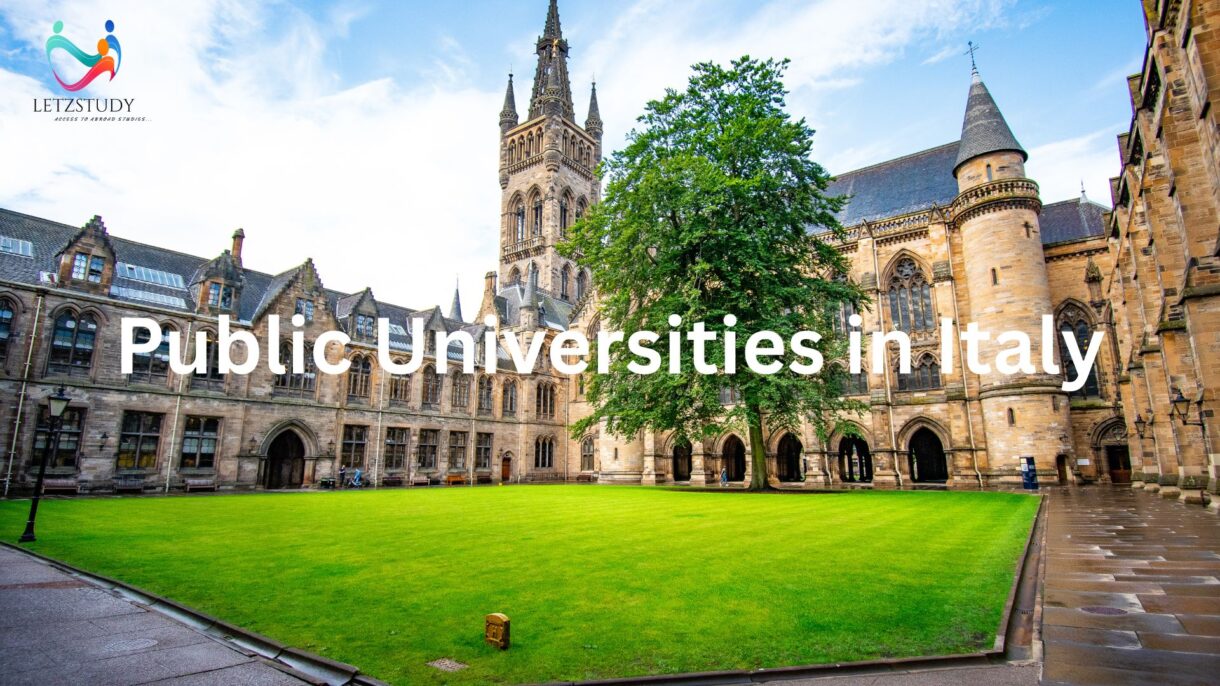
Italy has some of the best public universities in Europe if you’re looking into going to college or university abroad. These schools are popular with students from all over the world because they have a long history, good academics, and low tuition.
Italy’s public universities offer a world-class education in a wide range of fields, from the arts to engineering. This guide tells you everything you need to know about choosing the right university—how to apply, how much it will cost, what the most popular programs are, and insider tips. By the end, you’ll know exactly how to start your academic journey in Italy.
Why Go to Public Universities in Italy?
Italian public universities are known for being accessible, affordable, and high-quality.
Key Benefits
- Affordable Tuition: For EU students, annual fees are usually between €900 and €4,000. For international students, they are slightly higher but still far cheaper than private schools.
- A Long History of Education: Universities like Sapienza University of Rome and the University of Bologna have been teaching students for centuries.
- A Wide Range of Programmes: Italy’s public universities offer a variety of courses in both English and Italian, from humanities to engineering.
Italian public universities also immerse students in local culture, language, and research communities, creating a deeply engaging learning experience.
The Best Public Universities in Italy
Let’s take a closer look at some of the top public universities in Italy.
1. University of Bologna
- Founded: 1088 (one of the oldest universities in the world)
- Popular Programmes: Engineering, Medicine, Arts, Social Sciences
- Why Choose It: Offers extensive international programmes and research opportunities
2. Sapienza University of Rome
- Founded: 1303, with the largest student population in Europe
- Popular Programmes: Architecture, Economics, Law, Humanities
- Why Choose It: Strong academic reputation and vibrant student life
3. University of Padua
- Founded: 1222, known for pioneering scientific research
- Popular Programmes: Medicine, Psychology, Engineering, Law
- Why Choose It: Excellent research facilities and global partnerships
4. University of Milan
- Founded: 1924
- Popular Programmes: Biotechnology, Economics, Political Science, Arts
- Why Choose It: Strong ties to business and vibrant city life
5. University of Turin
- Founded: 1404
- Popular Programmes: Engineering, Medicine, Economics, Social Sciences
- Why Choose It: Affordable tuition and strong international support
Costs and Financial Aid
While studying in Italy is relatively affordable, it’s smart to plan your finances in advance.
- Tuition: Most programmes cost between €900 and €4,000 annually. Advanced English-language courses may cost slightly more.
- Cost of Living: Between €700 and €1,200 per month, depending on the city. The north is generally more expensive than the south.
- Scholarships: Many universities offer merit-based and need-based scholarships. The Italian government also runs programmes like Invest Your Talent in Italy.
Admission Process
Applying to public universities in Italy takes preparation and timing.
Step 1: Pick a Programme
Decide whether you’ll study in English or Italian. Review each programme’s eligibility criteria.
Step 2: Prepare Your Documents
Common requirements include:
- Academic transcripts and certificates
- Proof of English (IELTS/TOEFL) or Italian language proficiency
- Cover letter and CV
Step 3: Apply Online
Most universities have their own portals. Deadlines usually fall between January and May for the fall intake.
Step 4: Take Entrance Exams (if applicable)
Some courses like Medicine, Architecture, and Engineering require entrance tests.

Life as an International Student
Studying in Italy isn’t just about academics—it’s about the experience.
- Cultural Immersion: Italy’s art, food, and history make life more exciting.
- Student Services: Orientation programmes, language classes, and student associations help you settle in.
- Networking Opportunities: International collaborations open doors for internships and research.
Advice for Success
- Start Early: Visa and application processing can take time.
- Learn Basic Italian: It helps with daily life and local interactions.
- Apply for Scholarships: Maximize your chances by applying to several.
- Engage in Campus Life: Clubs and events make studying abroad more fulfilling.
- Seek Guidance: Consult education advisors or alumni for insights.
6 Problems University Managers Face in 2026
- Digital Transformation Delays: Only 8% of Italian businesses use AI. Universities struggle to adopt new tools.
- Graduate Employability Gap: Graduates often lack job-ready skills (symplicity.com).
- Sustainable Funding: Balancing quality and financial limits is a challenge.
- Declining Enrollments: Aging populations and migration affect student numbers.
- Gender-Based Violence: Recent student tragedies demand cultural change (The Guardian).
- Cultural Integration: Debates over diversity and inclusion continue (Reuters).
13 Expert Tips for Effective University Management
- Embrace digital tools
- Align curricula with industry needs
- Diversify funding sources
- Foster inclusion
- Encourage international collaboration
- Strengthen student support
- Promote lifelong learning
- Implement green practices
- Engage local communities
- Address mental health
- Innovate for inclusivity
- Track performance metrics
- Advocate for education-friendly policies
Case Study: The University of Cassino and Southern Lazio
A study on the Master Course in Global Economy and Business (GLEB) at the University of Cassino highlights how structured quality management improved performance. Their framework—with clear roles and accountability—set a benchmark for other Italian universities (ResearchGate).
Key Statistics
- Top Universities:
- University of Bologna
- Scuola Normale Superiore di Pisa
- Sapienza University of Rome
- Politecnico di Milano
- University of Padua (THE)
- Acceptance Rates:
- Public universities: 40%–60%
- Private universities: Around 20% (standyou.com)
Three Articles on Italian Public Universities
- Why universities in southern Italy are losing thousands of students – Nature, Nov 2023
- Comparing the Efficiency of Italian Public and Private Universities – Springer, 2016
- Higher Education in Italy: Between New Public Management and Autonomy – ResearchGate, 2022
Two Expert Quotes
- “The biggest problem with Italian universities isn’t getting in, but finishing school. It needs a lot of studying on your own with little help.” – Reddit user, r/Italian
- “Next Generation EU could change the game for research and education, especially in countries like Italy where funding is already a problem.” – Maurizio Tira, President, University of Brescia (eua.eu)

How LetzStudy Helped Three Students
Testimonial 1: Aarav Shetty from Mangalore
Aarav dreamed of studying in Europe but found the process in Italy overwhelming. LetzStudy guided him through applications and scholarships. Today, he’s pursuing a Master’s in Mechanical Engineering at Politecnico di Milano.
Testimonial 2: Nisha Rao from Bangalore
Nisha wanted to study economics in Italy but was confused by admission rules. LetzStudy offered one-on-one counselling, document support, and interview preparation. She’s now thriving at Sapienza University of Rome.
Testimonial 3: Raghav Hegde from Udupi
Raghav struggled to navigate scholarships and financial planning. LetzStudy simplified everything and helped him secure aid. He’s now studying Computer Science at the University of Bologna—calling LetzStudy’s guidance “life-changing.”
Universities regularly update their fees, eligibility, and policies. While we aim to keep this content accurate, readers should always check official sources for the latest information.
Ready to study at a public university in Italy?
Call LetzStudy today to schedule your personalised consultation and make your dream come true.
For more information, connect us on LinkedIn, and for daily updates, follow us on Instagram.

